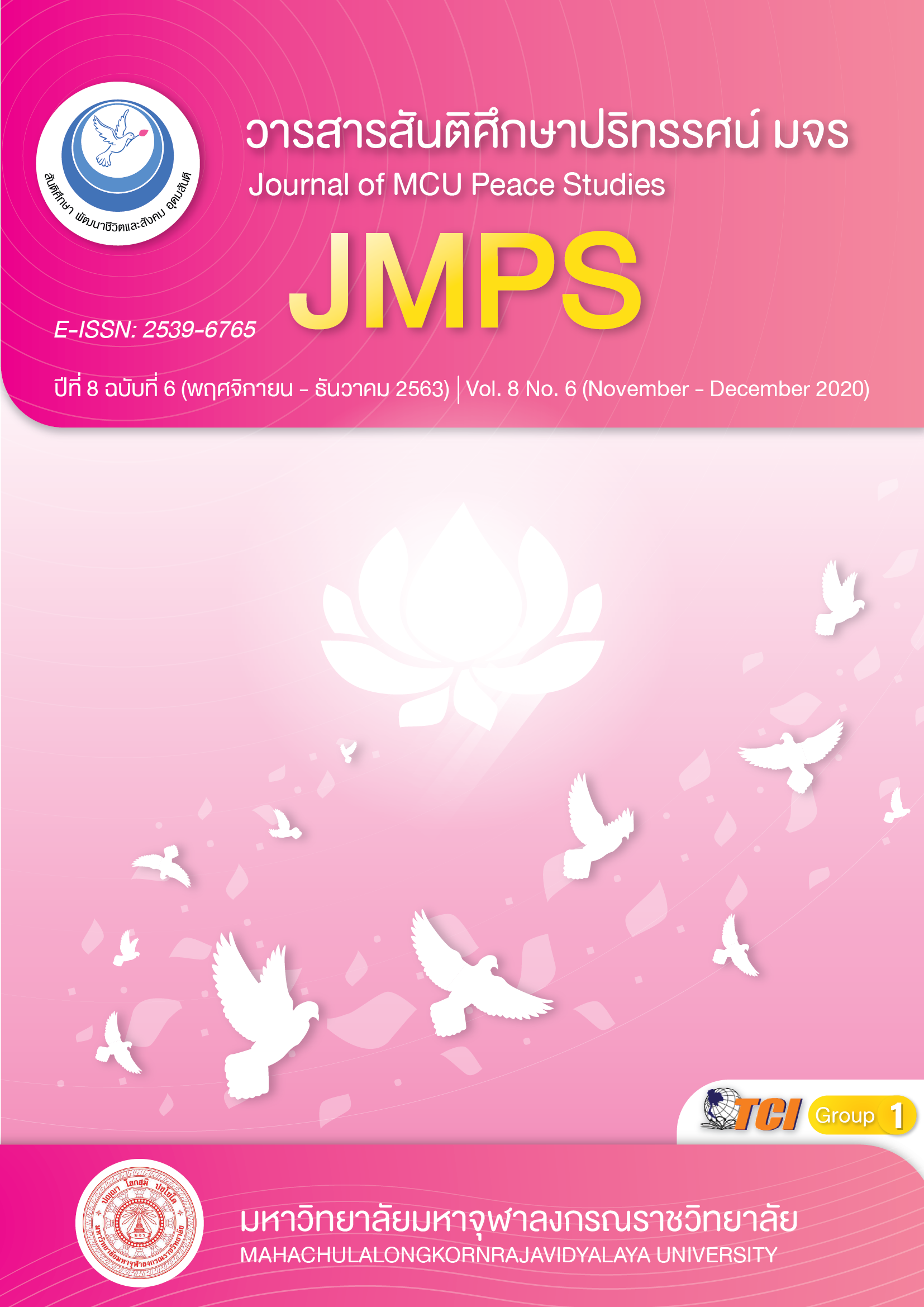ปัจจัยเชิงสาเหตุที่มีอิทธิพลต่อผลการดำเนินงานองค์กร ของการไฟฟ้าฝ่ายผลิตแห่งประเทศไทย
Main Article Content
บทคัดย่อ
บทความวิจัยครั้งนี้มีวัตถุประสงค์ 1) เพื่อศึกษาอิทธิพลของวัฒนธรรมองค์กร เทคโนโลยีสารสนเทศ การจัดการความเปลี่ยนแปลง และนวัตกรรมองค์กรที่มีต่อผลการดำเนินงานองค์กรของการไฟฟ้าฝ่ายผลิตแห่งประเทศไทย และ 2) เพื่อสร้างแบบจำลองสมการโครงสร้างที่อธิบายปัจจัยเชิงสาเหตุที่มีอิทธิพลต่อผลการดำเนินงานองค์กรของการไฟฟ้าฝ่ายผลิตแห่งประเทศไทย การวิจัยครั้งนี้เป็นการวิจัยเชิงปริมาณ กลุ่มตัวอย่างคือ ผู้บริหารและพนักงานจากการไฟฟ้าฝ่ายผลิตแห่งประเทศไทย จำนวน 438 คน โดยใช้เกณฑ์ 20 เท่าของตัวแปรสังเกตได้ ใช้วิธีการสุ่มตัวอย่างแบบแบ่งชั้นภูมิ เก็บข้อมูลด้วยแบบสอบถาม และวิเคราะห์ผลด้วยสถิติเชิงพรรณนา และแบบจำลองสมการโครงสร้าง ผลการวิจัยพบว่า 1) วัฒนธรรมองค์กร เทคโนโลยีสารสนเทศ การจัดการความเปลี่ยนแปลง และนวัตกรรมองค์กร มีอิทธิพลเชิงบวกต่อผลการดำเนินงานองค์กรของการไฟฟ้าฝ่ายผลิตแห่งประเทศไทย อย่างมีนัยสำคัญทางสถิติที่ระดับ .001 และ 2) แบบจำลองสมการโครงสร้างที่อธิบายปัจจัยเชิงสาเหตุที่มีอิทธิพลต่อผลการดำเนินงานองค์กรของการไฟฟ้าฝ่ายผลิตแห่งประเทศไทยที่ผู้วิจัยพัฒนาขึ้นมีความสอดคล้องกับข้อมูลเชิงประจักษ์ในระดับดี ยิ่งไปกว่านั้น ข้อค้นพบดังกล่าวนี้สามารถช่วยยกระดับผลการดำเนินงานองค์กร ด้วยการนำไปประยุกต์ใช้เป็นแนวทางในการจัดการ และการปรับปรุงการดำเนินงานในด้านต่าง ๆ ขององค์กรด้านพลังงานไฟฟ้าในประเทศไทยเพื่อความเป็นเลิศและความยั่งยืนภายใต้บริบทของอุตสาหกรรมพลังงานไฟฟ้าที่มีการพัฒนาอย่างรวดเร็ว
Article Details
ทัศนะและความคิดเห็นที่ปรากฏในบทความในวารสาร ถือเป็นความรับผิดชอบของผู้เขียนบทความนั้น และไม่ถือเป็นทัศนะและความรับผิดชอบของกองบรรณาธิการ ยินยอมว่าบทความเป็นลิขสิทธิ์ของวารสาร
เอกสารอ้างอิง
Al-Haddad, S., & Kotnour, T. (2015). Integrating the organizational change literature: a model for successful change. Journal of Organizational Change Management, 28(2), 234–262.
Ali, M., Seny Kan, K. A., & Sarstedt, M. (2016). Direct and configurational paths of absorptive capacity and organizational innovation to successful organizational performance. Journal of Business Research, 69(11), 5317–5323.
Astuti, E. (2018). The influence of information technology strategy and management support to the internal business process, competitive advantage, financial and non-financial performance of the company. International Journal of Web Information Systems, 14(3).
Cameron, K. S., & Quinn, R. E. (2011). Diagnosing and changing organizational culture: Based on the competing values framework. . Retrieved May 3, 2017, from https://www.wiley.com/enus/Diagnosing+and+Changing+Organizational+Culture%3A+Based+on+the+Competing+Values+Framework%2C+Revised+Edition-p-9781118047057
Chen, Z. et al. (2018). Fit between Organizational Culture and Innovation Strategy: Implications for Innovation Performance. Sustainability, 10(10), 3378.
Chiu, C.-N., & Yang, C.-L. (2018). Competitive Advantage and Simultaneous Mutual Influences between Information Technology Adoption and Service Innovation: Moderating Effects of Environmental Factors.
Structural Change and Economic Dynamics. Structural Change and Economic Dynamics, Elsevier, 49(C), 192-205.
De Waal, A., Goedegebuure, R., & Tan Akaraborworn, C. (2014). Adapting the high performance organization framework to the Thai context. Measuring Business Excellence, 18(2), 28–38.
De Waal, A., & Wang, A. (2017). Applicability of the high performance organization (HPO) framework in the Chinese context: The case of a state-owned enterprise. Journal of Chinese Human Resources Management, 8(1), 22–39.
Electricity Generating Authority of Thailand. (2018). Strategic Plan 2019 – 2020. Nonthaburi: n.p.
Evans, J., Allan, N., & Cantle, N. (2017). A new insight into the world economic forum global risks. Economic Papers: A journal of applied economics and policy, 36(2), 185-197.
Hair, J.F. et al. (2010). Multivariate data analysis. (7th ed.). New York: Pearson.
Honyenuga, B. Q., Tuninga, R. S. J., & Ghijsen, P. W. T. (2019). Management innovation and organisational performance: the mediating role of high performance organisation framework. International Journal of Business and Globalisation, 22(3), 295.
Jick, T. D., & Sturtevant, K. D. M. (2017). Taking Stock of 30 Years of Change Management: Is It Time for a Reboot?. Research in Organizational Change and Development, 33–79.
Khatoon, S., & Farooq, A. (2016). Impact of Organizational Change on Organizational Performance. Global Journal of Management And Business Research, 16(3), 1-12.
Kline, R. B. (2016). Principles and practice of structural equation modeling. (4th ed.). New York: The Guilford Press.
Le, P. B., & Lei, H. (2019). Determinants of innovation capability: the roles of transformational leadership, knowledge sharing and perceived organizational support. Journal of Knowledge Management, 23(3), 527-547.
Patyal, V. S., & Koilakuntla, M. (2018). Impact of organizational culture on quality management practices: an empirical investigation. Benchmarking: An International Journal, 25(5).
Rajapathirana, R. P. J., & Hui, Y. (2018). Relationship between innovation capability, innovation type, and firm performance. Journal of Innovation & Knowledge, 3(1), 44–55.
Rezaei, G. et al. (2016). Relationship between culture of excellence and organisational performance in Iranian manufacturing companies. Total Quality Management & Business Excellence, 29(1-2), 94–115.
Ketasingh, W. (2002). Statistical Analysis for Research. (5th ed). Bangkok: Chulalongkorn University.


